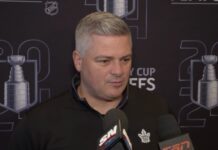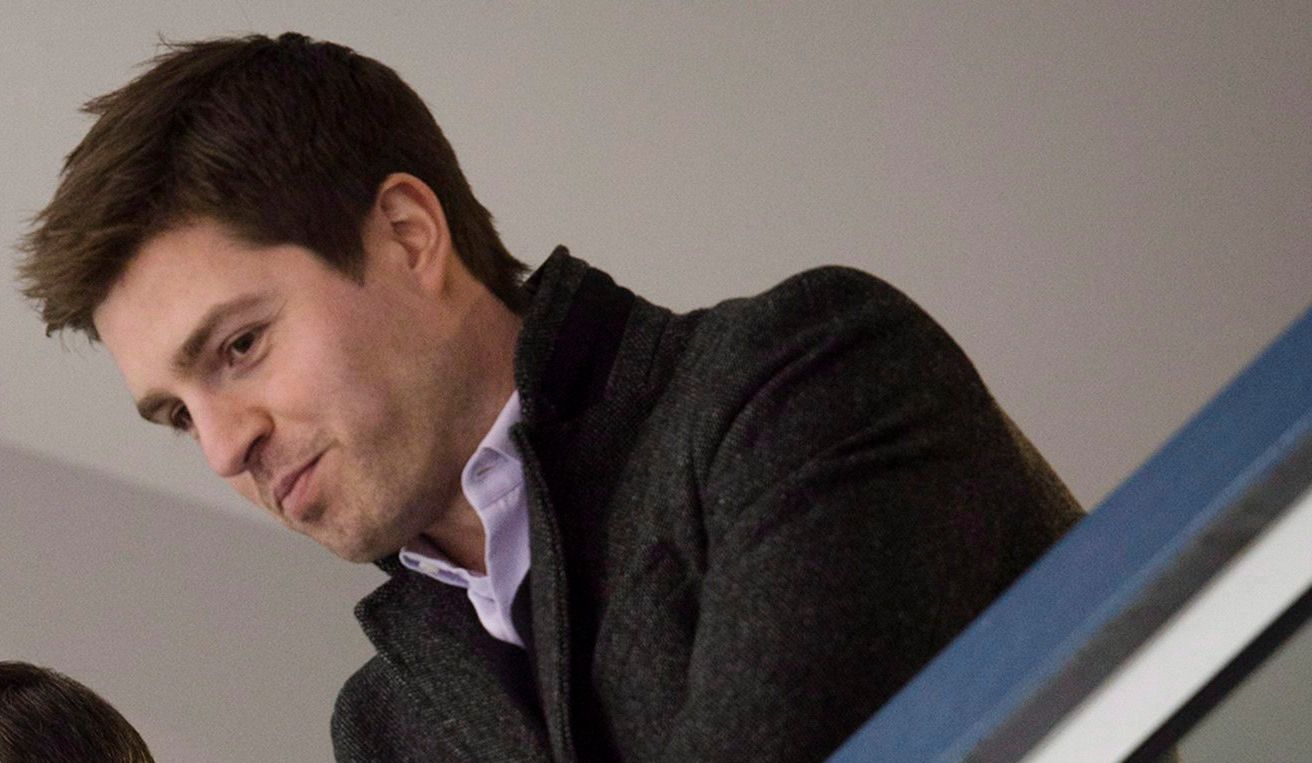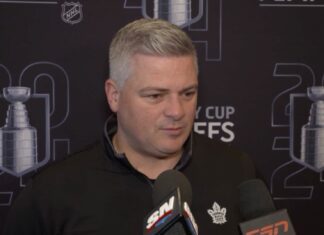General Manager Kyle Dubas joined Leafs Lunch on the first day of on-ice sessions at 2018 training camp, discussing the contract situation with William Nylander, what he’s evaluating over the next few days of camp, and much more.
As far as term, would the team be comfortable going longer with William Nylander?
Dubas: That’s been our focus. I know that the opposite has sort of been written quite a bit. Our major focus has been on longer term. He’s a player that we see as being a fit with our team for the long-term future. The whole time I’m here until they kick me out one day, William is a part of the group. That’s been our focus. There are varying different terms we can go to from one to eight years, but we see William as a long-term piece of our core here. He’s a good young player and we hope in the days and weeks to come we can get this sorted out and he’ll be back with the Maple Leafs.
This is the first RFA contract with Nylander. When you’re setting a tone for this, is it also setting a tone going forward?
Dubas: I think that’s the way a lot of people look at it. But I look at them all separately. We went through it with a few of our own RFAs who were not as long term or high profile. We went through it with Tavares. I think we just have a way we’re going to have to do this if we’re going to keep this rolling and sustain it in the future.
For me, it is not about sending a statement or anything like that. It’s about, “Here is where we are. Here is what we can do. Here is the logic it’s based in.” We continue to chip away at it. That’s the way I always look at it.
I know that because this is my first time in this chair, people use that tactic to look at it and say it’s him proving himself or sending a message, but it’s not really the way that I have approached it. William is a key piece for us and we want to have the best solution possible for everybody. That’s really our goal.
With Nylander not here, Tyler Ennis has been skating with Auston Matthews. When you signed Tyler Ennis, was there ever anything in the recesses of your mind thinking, “If something comes up, he might be able to fill in at a skilled position for somebody?”
Dubas: One of my primary jobs… the coaches are focused on the day to day and getting ready for practice and each individual game. Part of my major task is that, if something goes wrong or a player has a contract issue or a player retires or a player is sick, that we are going to be okay. When we signed Tyler, we kind of knew… We had signed John in the offseason, but we also lost some guys that were key parts for us in helping to turn our program around. We wanted to fill in with some depth.
We have a lot of guys challenging for the Marlies, but you can’t necessarily count on taking the most optimistic view of it. Tyler was available and it hadn’t gone well for him in Minnesota. They had bought him out. We knew he had talent. We thought our sports performance and sports science people could really work with him and he was willing to do that work. He is at a very interesting point in his career. It’s a great opportunity for him. He’s got a lot of incentive and we hope we can help him this year to get back to where he was.
He looks great. We’ll see him today with Marleau and Matthews.
You’re a first-time GM. We were joking about how you don’t use a board anymore. You’ve hired women to work within the organization. You are young, in your early 30s. Have you ever felt that there has been any kind of pushback? Are people accepting of this kind of new way of thinking, which a lot of people say you’re representing? Do you care? Do you just walk to the beat of your own drum? What has it been like, being viewed as the new kid on the block even though you’ve been in hockey for a while?
Dubas: I think it was the same way when I became the GM in the Soo. Once you become three or four or five years into the job, you expect people are going to test you. These are the best managers in hockey. They’re running these 31 teams. Some of them have had long, long careers and had a lot of success.
I was very fortunate that I was able to work with Lou and learn more than I could have ever imagined. It doesn’t get said a lot, but we have Cliff Fletcher in our office as well. On a day-to-day basis, most days during the season, you have two Hall of Fame GMs at your disposal to learn from and to pick their brain and ask them different questions. Both have been in the game for a very, very long time and have seen the game continue to evolve.
It’s always been my expectation that other GMs — it’s a very competitive business – are always going to test you. I haven’t gotten too caught up in how I am perceived or what others make think of me.
The way that I operate in terms of hiring – we try to go through a process of hiring the best people we can. I think Hailey adds a lot to our player personnel department just in her own experience being one of the best players, if not the best player, to ever play the sport. We don’t have anybody on our staff, besides Brendan, who can even remotely relate to the players on that. Some of our high-end players have already established a good relationship with her where she can help them because it’s a totally different way of thinking. That’s a major, major positive for us. We’ll just continue to do things that way.
In a market like Toronto, little things become big things. There was discussion yesterday about the fact that Marleau, Tavares and Rielly will be wearing As and Auston won’t be. What are your thoughts on that and the fact that a lot of your job is going to be putting the fireman’s hat on and putting out little fires before they become big fires?
Dubas: Rather than try to put out the fires, what I’ve always tried to do –whether it’s in the Soo or here with the Marlies and now the Leafs – is to be proactive rather than reactive once a fire is on. We kind of learned this in our first year here just in how different things have happened and how they can blow up. The whole Salute-gate thing where the players one day didn’t salute the fans and it became a major, major PR issue that Steve had to deal with. You learn from that and you’re always trying to be proactive.
Before that happened yesterday, we had an exact plan. I think it is always good for us to be transparent with our players about what we are doing. We had Auston come in because he’s the one that is going to get a lot of the questions. People look to him as someone who is going to be a leader on the team in the future and he is a leader now. You can tell by his presence and the way he operates. People look at him that way because of his talent.
We expect him, Mitch, and William to develop their leadership skills, but I think that falls on us and our management group and our coaches, to help him evolve and develop that way.
Where you mentioned that everything becomes a big thing in Toronto – I think the honours that are bestowed upon the players also carry a little bit more weight just because of the marketplace and the amount of media attention. You see the number of fans here and it’s really remarkable. We don’t want to do anything in haste. We want to be patient with everything that we do, and have the players naturally grow into those roles when they’re ready to.
It’s not to say that Auston isn’t ready or Mitch isn’t ready, or William wouldn’t be ready. We just want to make sure – especially when it comes to leadership and more off-ice things – that we really have done a good job to prepare them.
Was last night the first time you really addressed the whole group as GM? Can you share some of that message?
Dubas: I just said to the group… When you go in front of the players, you don’t want to go on forever and ever. The key thing we wanted to hammer home to our group was just what they can expect from me and the way I’ve always managed teams in the past, and what I’ve felt my responsibility was to them, and what they could expect of me, and what my expectations were going to be of our players and our staff.
Especially as our team has grown in talent and ability, with that comes expectations. Rather than allow those expectations to become pressure, the players have earned that. They should enjoy it. If they focus on the day to day and their process of what they do – how they eat, how they sleep, how they train, how they’re coached and the style that we play – that will eliminate a lot of that, especially when we have our downs during the season. If they can always go back to that process-oriented approach, it will help them to navigate those rough waters and really help our team group.
That was the key part of our message, and then to introduce our staff, which is a great staff. We are very fortunate to have the resources to have the people that we have.
It’s your first day of camp and you’ve done a lot of work to get here. What are you watching for? What are you doing today?
Dubas: I’m not trying to make it look like I’m really watching intently. I’m more interacting with the staff. We have a few smaller battles on our backend and at the depth spots, and we have decisions to sign guys who were drafted two years ago or so. It’s just been interacting with our staff on those issues. We are not going to sit here today and really judge how John Tavares or Auston Matthews or Jake Gardiner played today. They’re all going to be fine. I’m just trying to enjoy interacting with the players as I continue to adapt into this role. It’s the first day of camp, so everyone is excited. We’ll have our first scrimmage here, which will be awesome, and we’ll go from there.




![Sheldon Keefe Post Game, Leafs 3 vs. Bruins 2: “I loved [the Matthews] line, and I loved a lot about our game all the way through the lineup” Sheldon Keefe, Toronto Maple Leafs post game](https://mapleleafshotstove.com/wp-content/uploads/2024/04/keefe-pg-game-1-218x150.jpg)


























![Sheldon Keefe Post Game, Leafs 3 vs. Bruins 2: “I loved [the Matthews] line, and I loved a lot about our game all the way through the lineup” Sheldon Keefe, Toronto Maple Leafs post game](https://mapleleafshotstove.com/wp-content/uploads/2024/04/keefe-pg-game-1-100x70.jpg)



